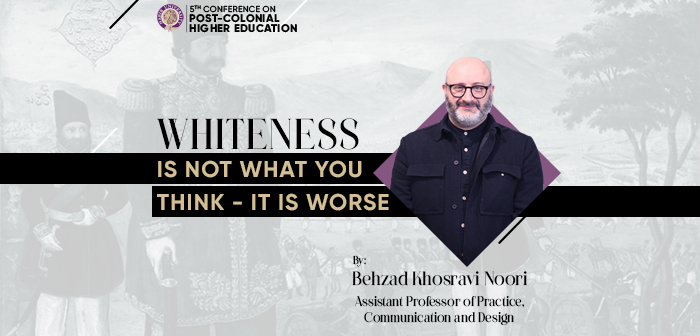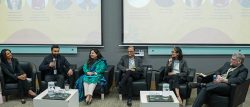For some, the title of this year’s Conference on Post-Colonial Higher Education, ‘Whiteness in South Asia, India, Iran and Pakistan, might lead to confusion: given that whiteness belongs to the ‘white societies’, how can we talk about whiteness within non-white geographies from the vantage point of a modern colonial mentality? Or, taking the question even further: Does such a thing as whiteness even exist in our region?
In his introduction to the conference, Nauman Naqvi described the conference’s aim: to attempt to engage, explore and recognize one of the key supports of the modern substantial and symbolic order, and one of the master concepts of modernity – whiteness. In this case, we witness the effect of whiteness as an extensive form of domination throughout the post-colonial world that has created systematic subjugation of embryonic culture, as well as hegemonic economics and politics, in both visible and invisible, conscious and unconscious ways.
To discuss whiteness in our region is to examine such a process of ‘invisibilisation’ – the hidden characteristics of classic racism that define those of us living within the same geographical context as different, and thus dictate a discriminatory governing apparatus.
This perspective is essential if we are to address the fact that while the term ‘post-colonialism’ indicates a period after the classic colonial past, our reality is far from one of decolonisation. Indeed, the ‘post’ in ‘post-colonialism’ is not an indication that colonial times are in the past, but rather a clear indication that we live in the post-colony, where great power still exists and dominates through multifaceted aggression in the name of nationalism. As Dr. Naqvi pointed out, the idiotic and senseless war in Ukraine and the Western media’s response to it are just one current example of how whiteness is rooted deep within our social fabric.
The crucial question in this time and condition for us, the people of the South, is how to talk and think about whiteness amid multifaced aggressions domestically and internationally; for it is only through doing so that we can progress the process of decolonisation in our hyper-politicised time.
What methods of engagement are at our disposal to investigate history, to seize memory in the moment of danger?
We need to explore, recognize, and critically observe the interconnectivity of Eurocentrism, imperialism, commodification, whiteness, the regime of representation and other elements that directly affect our lives here and now in South Asia to dig into the phantasm of whiteness and its internalisation among locals.
I define ‘the colonial’ as the conditions by which any dominating power imposes itself upon another region or people for material gain and the acquisition of strategic advantage over third-party rivals. This colonial domination simultaneously initiates supremacy of particular modes of knowledge production and methods of scientific engagement. This dominion is not just about what one can say, but how it is possible to say it. Indeed, the unconscious colonial memory rooted in the social characteristics of the post-colonial era still configures a dis/function of the social order. Therefore, the mode by which we must emancipate ourselves from the primary identity of modernism – race and whiteness – is not to become colour blind but to discover, explore, and cultivate self-reflexivity within the colonial, modern nationalistic meditation of modernism. In other words, we must go beyond the restraints upon knowledge engendered by the national apparatus and colonial thought.
In keeping with the conference’s core concept, participants discussed phenomena ranging from colonial governmentality and regional nationalism to the aesthetics of whiteness and regional literature and music. Here, a trans-local positionality and critical historiographic approach offered valuable intersectional insights into the racialised processes that stratify education and knowledge production in the here and now.
The conference was an attempt to provide a platform for ‘rethinking’ modern history and its central concept of whiteness. To reject the phantasm of whiteness, we need a rebellion of history – a destabilisation of what is known as history in order to revive its assortment, which inheres in the relationships between micro and macro. We must not only replace memory with another image but destabilise the image of modern history itself.
This opinion piece was written by Dr Behzad Khosravi Noori
Artist, Writer, and Educator, Assistant Professor of Practice, Habib University.




